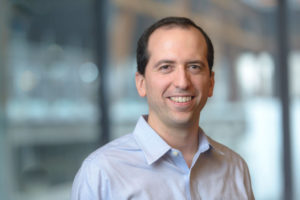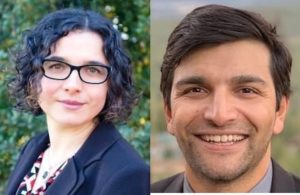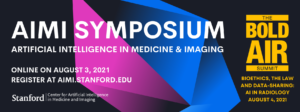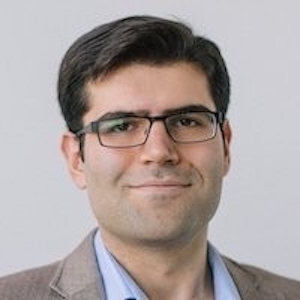
CEDSS: “Building a Scalable Clinical Genomics Program: How tumor, normal, and plasma DNA sequencing are informing cancer care, cancer risk, and cancer detection”
Elizabeth and Felix Rohatyn Chair & Associate Director of the Marie-Josée and Henry R. Kravis Center for Molecular Oncology
Memorial Sloan Kettering Cancer Center
Zoom Details
Meeting URL: https://stanford.zoom.us/s/92559505314
Dial: US: +1 650 724 9799 or +1 833 302 1536 (Toll Free)
Meeting ID: 925 5950 5314
Passcode: 418727
11:00am – 12:00pm Seminar & Discussion
RSVP Here
ABSTRACT
Tumor molecular profiling is a fundamental component of precision oncology, enabling the identification of oncogenomic mutations that can be targeted therapeutically. To accelerate enrollment to clinical trials of molecularly targeted agents and guide treatment selection, we have established a center-wide, prospective clinical sequencing program at Memorial Sloan Kettering Cancer Center using a custom, paired tumor-blood normal sequencing assay (MSK-IMPACT), which we have used to profile more than 50,000 patients with solid tumors. Yet beyond just the characterization of tumor-specific alterations, the inclusion of blood DNA has readily enabled the identification of germline risk alleles and somatic mutations associated with clonal hematopoiesis. To complement this approach, we have also implemented a ‘liquid biopsy’ cfDNA panel (MSK-ACCESS) for cancer detection, surveillance, and treatment selection and monitoring. In my talk, I will describe the prevalence of somatic and germline genomic alterations in a real-world population, the clinical benefits of cfDNA assessment, and how clonal hematopoiesis can inform cancer risk and confound liquid biopsy approaches to cancer detection.
ABOUT
Michael Berger, PhD, holds the Elizabeth and Felix Rohatyn Chair and is Associate Director of the Marie-Josée and Henry R. Kravis Center for Molecular Oncology at Memorial Sloan Kettering Cancer Center, a multidisciplinary initiative to promote precision oncology through genomic analysis to guide the diagnosis and treatment of cancer patients. He is also an Associate Attending Geneticist in the Department of Pathology with expertise in cancer genomics, computational biology, and high-throughput DNA sequencing technology. His laboratory is developing experimental and computational methods to characterize the genetic makeup of individual cancers and identify genomic biomarkers of drug response and resistance. As Scientific Director of Clinical NGS in the Molecular Diagnostics Service, he oversees the development and bioinformatics associated with clinical sequencing assays, and he helped lead the development and implementation of MSK-IMPACT, a comprehensive FDA-authorized tumor sequencing panel that been used to profile more than 60,000 tumors from advanced cancer patients at MSK. The resulting data have enabled the characterization of somatic and germline biomarkers across many cancer types and the identification of mutations associated with clonal hematopoiesis. Dr. Berger also led the development of a clinically validated plasma cell-free DNA assay, MSK-ACCESS, which his laboratory is using to explore tumor evolution, acquired drug resistance, and occult metastatic disease. He received his Bachelor’s Degree in Physics from Princeton University and his Ph.D. in Biophysics from Harvard University.
Hosted by: Utkan Demirci, Ph.D.
Sponsored by: The Canary Center & the Department of Radiology
Stanford University – School of Medicine

Join us for a panel on Behavioral XR on Thursday, June 3rd from 9:00 – 10:30 am PDT. The event will start with a one-hour panel discussion featuring Dr. Elizabeth McMahon, a psychologist with a private practice in California; Sarah Hill of Healium, a company developing XR apps for mental fitness based in Missouri; Christian Angern of Sympatient, a company developing VR for anxiety therapy based in Germany; and Marguerite Manteau-Rao of Penumbra, a medical device company based in California. This panel will be moderated by Dr. Walter Greenleaf of Stanford’s Virtual Human Interaction Lab (VHIL) and Dr. Christoph Leuze of the Stanford Medical Mixed Reality (SMMR) program. Immediately following the panel discussion, you are also invited to a 30-minute interactive session with the panelists where questions and ideas can be explored in real time.
Register here to save your place now! After registering, you will receive a confirmation email containing information about joining the meeting.
Please visit this page to subscribe to our events mailing list.
Sponsored by Stanford Medical Mixed Reality (SMMR)

Radiology Department-Wide Research Meeting
• Research Announcements
• Mirabela Rusu, PhD – Learning MRI Signatures of Aggressive Prostate Cancer: Bridging the Gap between Digital Pathologists and Digital Radiologists
• Akshay Chaudhari, PhD – Data-Efficient Machine Learning for Medical Imaging
Location: Zoom – Details can be found here: https://radresearch.stanford.edu
Meetings will be the 3rd Friday of each month.
Hosted by: Kawin Setsompop, PhD
Sponsored by: the the Department of Radiology

Stanford AIMI Director Curt Langlotz and Co-Directors Matt Lungren and Nigam Shah invite you to join us on August 3 for the 2021 Stanford Center for Artificial Intelligence in Medicine and Imaging (AIMI) Symposium. The virtual symposium will focus on the latest, best research on the role of AI in diagnostic excellence across medicine, current areas of impact, fairness and societal impact, and translation and clinical implementation. The program includes talks, interactive panel discussions, and breakout sessions. Registration is free and open to all.
Also, the 2nd Annual BiOethics, the Law, and Data-sharing: AI in Radiology (BOLD-AIR) Summit will be held on August 4, in conjunction with the AIMI Symposium. The summit will convene a broad range of speakers in bioethics, law, regulation, industry groups, and patient safety and data privacy, to address the latest ethical, regulatory, and legal challenges regarding AI in radiology.

Regina Barzilay, PhD
School of Engineering Distinguished Professor for AI and Health
Electrical Engineering and Computer Science Department
AI Faculty Lead at Jameel Clinic for Machine Learning in Health
Computer Science and Artificial Intelligence Lab
Massachusetts Institute of Technology
Abstract:
In this talk, I will present methods for future cancer risk from medical images. The discussion will explore alternative ways to formulate the risk assessment task and focus on algorithmic issues in developing such models. I will also discuss our experience in translating these algorithms into clinical practice in hospitals around the world.
Keynote:
Self-Supervision for Learning from the Bottom Up
Why do self-supervised learning? A common answer is: “because data labeling is expensive.” In this talk, I will argue that there are other, perhaps more fundamental reasons for working on self-supervision. First, it should allow us to get away from the tyranny of top-down semantic categorization and force meaningful associations to emerge naturally from the raw sensor data in a bottom-up fashion. Second, it should allow us to ditch fixed datasets and enable continuous, online learning, which is a much more natural setting for real-world agents. Third, and most intriguingly, there is hope that it might be possible to force a self-supervised task curriculum to emerge from first principles, even in the absence of a pre-defined downstream task or goal, similar to evolution. In this talk, I will touch upon these themes to argue that, far from running its course, research in self-supervised learning is only just beginning.

CEDSS: The First Cell: A new model for cancer research and treatment
Azra Raza, M.D.
Chan Soon-Shiong Professor of Medicine
Director, Myelodysplastic Syndrome Center
Columbia University Medical Center
Location: Zoom
Meeting URL: https://stanford.zoom.us/s/99340345860
Dial: US: +1 650 724 9799 or +1 833 302 1536 (Toll Free)
Meeting ID: 993 4034 5860
Passcode: 711508
ABSTRACT
Cancer research continues to be predicated on a 1970’s model of research and treatment. Despite half a century of intense research, we are failing spectacularly to improve the outcome for patients with advanced disease. Those who are cured continue to be treated mostly with the older strategies (surgery-chemo-radiation). Our contention is that the real solution to the cancer problem is to diagnose cancer early, at the stage of The First Cell. The rapidly evolving technologies are doing much in this area but need to be expanded. We study a pre-leukemic condition called myelodysplastic syndrome (MDS) with the hope that we can detect the first leukemia cells as the disease transforms to acute myeloid leukemia (AML). Towards this end, we have collected blood and bone marrow samples on MDS and AML patients since 1984. Today, our Tissue Repository has more than 60,000 samples. We propose novel methods to identify surrogate markers that can identify the First Cell through studying the serial samples of patients who evolve from MDS to AML.
ABOUT
Dr. Raza is a Professor of Medicine and Director of the MDS Center at Columbia University in New York, NY.She started her research in Myelodisplastic Syndromes (MDS) in 1982 and moved to Rush University, Chicago, Illinois in 1992, where she was the Charles Arthur Weaver Professor in Oncology and Director, Division of Myeloid Diseases. The MDS Program, along with a Tissue Repository containing more than 50,000 samples from MDS and acute leukemia patients was successfully relocated to the University of Massachusetts in 2004 and to Columbia University in 2010.
Before moving to New York, Dr. Raza was the Chief of Hematology Oncology and the Gladys Smith Martin Professor of Oncology at the University of Massachussetts in Worcester. She has published the results of her laboratory research and clinical trials in prestigious, peer reviewed journals such as The New England Journal of Medicine, Nature, Blood, Cancer, Cancer Research, British Journal of Hematology, Leukemia, and Leukemia Research. Dr. Raza serves on numerous national and international panels as a reviewer, consultant and advisor and is the recipient of a number of awards.
Hosted by: Utkan Demirci, Ph.D.
Sponsored by: The Canary Center & the Department of Radiology
Stanford University – School of Medicine

Saeed Hassanpour, PhD
Associate Professor of Biomedical Data Science
Associate Professor of Epidemiology
Associate Professor of Computer Science
Dartmouth Geisel School of Medicine
Deep Learning for Histology Images Analysis
Abstract:
With the recent expansions of whole-slide digital scanning, archiving, and high-throughput tissue banks, the field of digital pathology is primed to benefit significantly from deep learning technology. This talk will cover several applications of deep learning for characterizing histopathological patterns on high-resolution microscopy images for cancerous and precancerous lesions. Furthermore, the current challenges for building deep learning models for pathology image analysis will be discussed and new methodological advances to address these bottlenecks will be presented.
About:
Dr. Saeed Hassanpour is an Associate Professor in the Departments of Biomedical Data Science, Computer Science, and Epidemiology at Dartmouth College. His research is focused on machine learning and multimodal data analysis for precision health. Dr. Hassanpour has led multiple NIH-funded research projects, which resulted in novel machine learning and deep learning models for medical image analysis and clinical text mining to improve diagnosis, prognosis, and personalized therapies. Before joining Dartmouth, he worked as a Research Engineer at Microsoft. Dr. Hassanpour received his Ph.D. in Electrical Engineering with a minor in Biomedical Informatics from Stanford University and completed his postdoctoral training at Stanford Center for Artificial Intelligence in Medicine & Imaging.

Indrani Bhattacharya, PhD
Postdoctoral Research Fellow
Department of Radiology
Stanford University
Title: Multimodal Data Fusion for Selective Identification of Aggressive and Indolent Prostate Cancer on Magnetic Resonance Imaging
Abstract: Automated methods for detecting prostate cancer and distinguishing indolent from aggressive disease on Magnetic Resonance Imaging (MRI) could assist in early diagnosis and treatment planning. Existing automated methods of prostate cancer detection mostly rely on ground truth labels with limited accuracy, ignore disease pathology characteristics observed on resected tissue, and cannot selectively identify aggressive (Gleason Pattern≥4) and indolent (Gleason Pattern=3) cancers when they co-exist in mixed lesions. This talk will cover multimodal and multi-scale fusion approaches to integrate radiology images, pathology images, and clinical domain knowledge about prostate cancer distribution to selectively identify and localize aggressive and indolent cancers on prostate MRI.

Rogier van der Sluijs, PhD
Postdoctoral Research Fellow
Department of Radiology
Stanford University
Title: Pretraining Neural Networks for Medical AI
Abstract: Transfer learning has quickly become standard practice for deep learning on medical images. Typically, practitioners repurpose existing neural networks and their corresponding weights to bootstrap model development. This talk will cover several methods to pretrain neural networks for medical tasks. The current challenges for pretraining neural networks in Radiology will be discussed and recent advancements that address these bottlenecks will be highlighted.

Nina Kottler, MD, MS
Associate Chief Medical Officer, Clinical AI
VP Clinical Operations
Radiology Partners
Abstract:
We have a call to action in healthcare – we need to drive value. Artificial intelligence (AI), if deployed correctly, can help accomplish this lofty mission. In this discussion we will review the following lessons learned in deploying radiology AI at scale: 4 unexpected benefits of implementing AI emergent finding triage; the importance of investing in AI radiologist education; how “most” AI needs to be incorporated into the radiologist workflow; why a platform is required to deploy AI at scale and what a modern platform looks like; how to use AI to add value to your data; and, as Dr. Curt Langlotz famously said, why rads (practices) who use AI will replace those who don’t (a depiction of what the role of the radiologist might look like in a tech enabled future).
Bio:
Dr. Kottler has been a practicing radiologist specializing in emergency imaging for over 16 years. Combining her clinical experience with a graduate degree in applied mathematics, she has been using technological innovation to drive value in radiology. As the first radiologist to join Radiology Partners, Dr. Kottler has held multiple leadership positions within her practice and is currently the associate Chief Medical Officer for Clinical AI. Externally Dr. Kottler serves on multiple committees for the ACR, RSNA, and SIIM. Dr. Kottler is also passionate about promoting diversity and creating a culture of belonging. As such she is a member of the AAWR, is a member of the diversity and inclusion committee at SIIM, serves on the steering committee for RAD=, and leads the education and development division of the Belonging Committee within Radiology Partners.